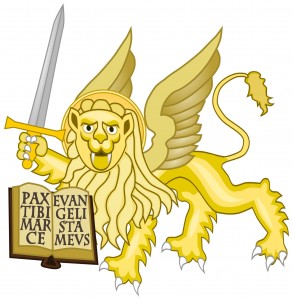The shortest of the gospels, the Tradition of the Church speaks of Saint Mark as the interpreter of Saint Peter. It is believed that he worked closely with Peter. So, we have a keen insight into the thoughts of Peter, the one chosen by the Lord to head the Church through Mark. Moreover, he founded the Church in Alexandria and is revered by the Church in Rome and Venice (where his relics rest) among other cities.
The liturgical biography for Saint Mark reads thusly:
Saint Mark, also named John, was the cousin of Barnabas. It seems that he belonged to the tribe of Levi. In the Acts of the Apostles (Acts 12:12), it is said that the Christians gathered in his mother Mary’s home to pray. Converted to the Christian faith by Saint Peter, he went to Antioch with Saint Paul and Saint Barnabas around the year 44 and afterwards went to Cyprus and Pamphylia, then returned to Jerusalem. He was with Saint Paul at the time of his first captivity, having followed Saint Peter to Rome to serve him as an interpreter. During Saint Paul’s second captivity, Mark was in Asia around 66 or 67. At the request of the Roman Christians, he wrote his Gospel in Greek-the second Gospel after that of Saint Matthew. According to the historian Eusebius and ancient tradition, he afterwards went to Egypt where he had preached the Gospel and founded the Church of Alexandria. He was martyred at an unknown date. His holy body was transferred to Venice by some travellers in 828. The symbol of the lion is reserved to him, the second of Ezekiel’s symbolic animals (Ezekiel 1:10). Perhaps for this reason alone his Gospel is second in the series of the Four Gospels.
From a treatise Against Heresies by Saint Irenaeus for the feast:
The Church, which has spread everywhere, even to the ends of the earth, received the faith from the apostles and their disciples. By faith, we believe in one God, the almighty Father who made heaven and earth and the sea and all that is in them. We believe in one Lord Jesus Christ, the Son of God, who became man for our salvation. And we believe in the Holy Spirit who through the prophets foretold God’s plan: the coming of our beloved Lord Jesus Christ, his birth from the Virgin, his passion, his resurrection from the dead, his ascension into heaven, and his final coming from heaven in the glory of his Father, to recapitulate all things and to raise all men from the dead, so that, by the decree of his invisible Father, he may make a just judgment in all things and so that every knee should bow in heaven and on earth and under the earth to Jesus Christ our Lord and our God, our Savior and our King, and every tongue confess him.
The Church, spread throughout the whole world, received this preaching and this faith and now preserves it carefully, dwelling as it were in one house. Having one soul and one heart, the Church holds this faith, preaches and teaches it consistently as though by a single voice. For though there are different languages, there is but one tradition.
The faith and the tradition of the churches founded in Germany are no different from those founded among the Spanish and the Celts, in the East, in Egypt, in Libya and elsewhere in the Mediterranean world. Just as God’s creature, the sun, is one and the same the world over, so also does the Church’s preaching shine everywhere to enlighten all men who want to come to a knowledge of the truth.
Now of those who speak with authority in the churches, no preacher however forceful will utter anything different—for no one is above the Master—nor will a less forceful preacher diminish what has been handed down. Since our faith is everywhere the same, no one who can say more augments it, nor can anyone who says less diminish it.
